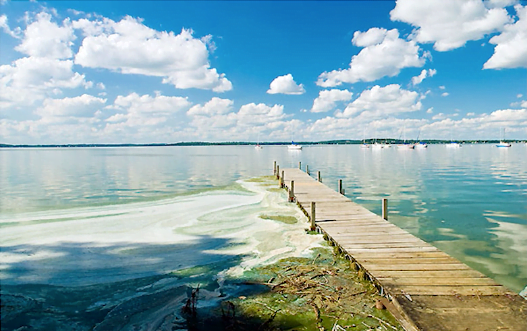Wisconsin’s Yahara River Watershed and its five lakes define Dane County and Greater Madison’s sense of place. Lakes Mendota, Monona, Wingra, Waubesa, and Kegonsa contribute significantly to the region’s economic vitality, recreational offerings, and quality of life.
Despite years of investment in project-by-project water quality improvements, however, the five lakes remain federally impaired. The highly eutrophic lakes continue to suffer from serious blue-green algae blooms and E Coli outbreaks which close public beaches, degrade wildlife habitats, and impact local economies. Intensifying climate impacts such as heavier rain and runoff, invasive species, and increasing water temperatures threaten progress to reverse poor water quality.
One nonprofit water advocacy organization, the Clean Lakes Alliance, has united an unprecedented inter-agency coalition to cooperatively lead the way towards a cleaner future for the watershed through targeted, joint planning efforts and actionable steps to improve lake quality. The Yahara CLEAN Compact, made up of 19 local municipalities, agencies, private enterprises and non-profits, seeks to improve and protect regional water quality by expanding and strengthening community partnerships and uniting around a common vision and action plan to which all members are accountable. Ultimately, it is a framework to cooperatively deliver bold, timely, data-driven solutions to improve water quality at a regional scale.
This presentation will provide an overview of the Yahara CLEAN 3.0 Plan, a strategic plan developed by Yahara CLEAN Compact members and their consultants to tackle watershed phosphorus by combining the power of science with collective community action. This plan builds off and improves on previous plans that addressed the science of phosphorus loading, but which lacked a multijurisdictional framework for optimal implementation or the champions to deliver significant progress. Compact representatives will highlight how the group has overcome political challenges, identified and engaged key constituent groups (developers and urban areas, agricultural producers, institutions and industry), and developed strategies to motivate each group towards shared, measurable goals. Their efforts include leveraging decades of research and monitoring data, updating models for phosphorus loading and lake response to factor in changing climate conditions, identifying and prioritizing wide-scale management techniques for capturing phosphorus in runoff, and developing a targeted regional action and communication plan. Ultimately, Yahara CLEAN 3.0 is a playbook defining key roles and responsibilities for all constituents in the watershed so everyone has a clear understanding of what they can do to delist these federally impaired water bodies and restore their critical vitality and value.
About Instructors
Course Content




